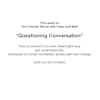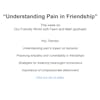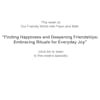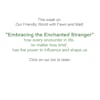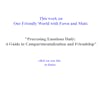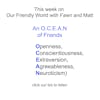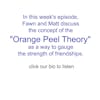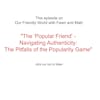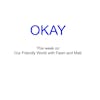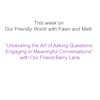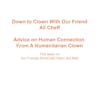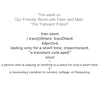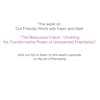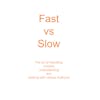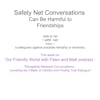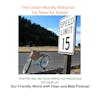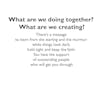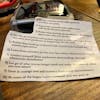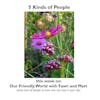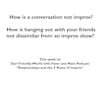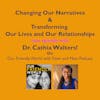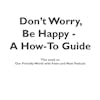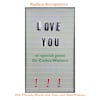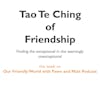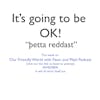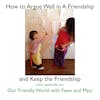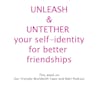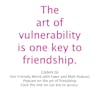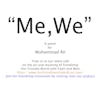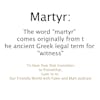
Slow vs Fast Communication

Fast vs Slow - The art of friendship involves understanding and working with various rhythms.
This week, Fawn and Matt are unraveling the intricate art of relationships, and the kaleidoscope-like complexity of humanity. Their conversation touches on the intricacies of processing information, the dynamics of communication in friendships, the balance between individuality and collective success, and the ever-evolving nature of human relationships.

Fast vs Slow - The art of friendship involves understanding and working with various rhythms.
This week, Fawn and Matt are unraveling the intricate art of relationships, and the kaleidoscope-like complexity of humanity. Their conversation touches on the intricacies of processing information, the dynamics of communication in friendships, the balance between individuality and collective success, and the ever-evolving nature of human relationships.
Fast vs Slow - The art of friendship involves understanding and working with various rhythms.
This week, Fawn and Matt are unraveling the intricate art of relationships, and the kaleidoscope-like complexity of humanity. Their conversation touches on the intricacies of processing information, the dynamics of communication in friendships, the balance between individuality and collective success, and the ever-evolving nature of human relationships.
Slow Reader Fast Communicator
TRANSCRIPT
[00:00:00] Fawn: It takes me forever to read something. Forever. Skim it! No! Done! No! I can't. I can't. And, in school They, first they thought I was genius, so they put me in the genius category in elementary school, like really advanced. And then when it came to reading, they were like, uh oh. So then I, I, I kept getting left behind.
[00:00:26] Fawn: So, but no one explained anything. I was never tested for anything. But I think I need a spiritual test. Because, I mean, and then what? And then for the rest of my life I have this complex about Not being smart enough, even though I'm always studying. I'm always learning. Ah, I just feel awful. And then also, I don't like to tell people that I'm a homeschooling mom.
[00:00:50] Fawn: Like, I homeschool these genius kids over here, right? Mm hmm. I feel embarrassed because I'm like, uh, because I feel stupid so much. But from a very early age, I taught our kids how to read. And I was praying they wouldn't have the problems I had, right? So they started to read, they were in diapers and reading.
[00:01:12] Fawn: One kid came over to our house who was the same age. And the kid had a full blown tantrum. Because our kid that was exactly his age was reading to him. And he was so frustrated, he got so jealous. He had a full on tantrum. Because he couldn't read the book at all. He didn't know what was happening.
[00:01:32] Fawn: Right. So they were reading, like, if you listen to our episode a few episodes back, they were complaining that I made them read The Odyssey when they were, when they were four years old, but despite that, I noticed early on, when we were doing schoolwork, and , we all had to read, I'm like, okay, everybody read this paragraph on your own.
[00:01:54] Fawn: And then we're going to answer the question that's written underneath, right? Right. They would read two, three paragraphs within, I swear, like four seconds. It was outrageous. I'm like, you guys are now just guessing. So then I would test them. I'm like, well, what, what did the third line talk about? And they would tell me.
[00:02:14] Fawn: I'm like, oh my God. So basically I'm still reading the second sentence and they're done with the whole page of reading. The whole page. And this is what, they're like six years old. It was embarrassing. Thank God I was by myself, because I'm like, no one else has to know, but I'm letting you all know. Like, I just read slowly, and I thought it was just a reading problem, but today, today I had the epiphany, or whatever you want to call it, but like, we were both watching an interview with a politician, and he would say a sentence, and I had to, I had to, uh, what's the word?
[00:02:51] Fawn: Parse?
[00:02:53] Fawn: Process. So, here's what happened. We were watching an interview with a politician.
[00:02:58] Fawn: You, Matt, you would have comments and insights on everything this guy was saying. Meanwhile, I'm like, I was, I don't know, three, four sentences behind you. And I realized, oh my goodness, just like how I read slowWhen someone is speaking, I'm still stuck on the first sentence and what that sentence is actually saying, what it implies, what is happening.
[00:03:24] Fawn: So I'd like to believe that I'm thinking about it on a supernatural level, on like an intuition level, like what is this guy really saying, like what did that really mean? Or maybe it's because English is not my first language. And I'm not saying I'm better than, better in any other language. I'm just saying my, I think my brain processes things differently.
[00:03:45] Fawn: Because going from one country to another country and realizing things aren't translated the way you think they are. So you have to kind of shift your way of thinking. Like how an episode back we were talking about this culture versus this other culture. Right. Like, we understand things differently, and we behave differently, right?
[00:04:04] Fawn: Mm hmm. I don't know what it is, but I realized, oh my goodness, even my processing is slow. So if I'm listening to something, you're current with what's being said in the moment, and you're right on it. Meanwhile, I've missed whole sentences, and this is why it didn't do well in school. Because I'm like, hold on.
[00:04:27] Fawn: What? What did they, what? I'm behind. Okay. In what was said. There's
[00:04:32] MATT: kind of two things going on there, though. Number one is, yes indeed, you're processing through the sentence.
[00:04:39] Fawn: And by the way, this works with friendship. This is how we relate to one another. Right, and this
[00:04:43] MATT: is how we communicate. The other thing to think about, though, is And I was just reading about this today.
[00:04:51] MATT: Phenomenal book that we're going to get into in a later podcast. Oh my goodness.
[00:04:55] Fawn: I found him. I
[00:04:56] MATT: found him. I'm so excited, but that's beside the point. But one of the things this person brought up is. If I'm already formulating what I'm going to say back as you're going through your first sentence, I'm not paying attention.
[00:05:10] MATT: Of course. My attention, or rather, it's not that I'm not paying attention, I'm not giving you 100 percent of my attention. Mm hmm. Which is kind of doing you a disservice as a friend. Mm hmm. Or spouse, or whatever it
[00:05:24] Fawn: happens to be. Yeah, you're just worried about how you're responding. Right. You want to be heard.
[00:05:29] Fawn: You're not hearing the person. You want to be heard. This is me trying to hear the person But I need one sentence at a time. I can't, I can't focus on a whole conversation if there are other things. I think it's because I'm picking up on lies If someone is lying or deceitful or they're they're tricky, I think my brain picks up on it So I'm like pausing So I can't hear the other sentences.
[00:05:58] Fawn: It's not that I'm not listening. Mm hmm. I'm hyper listening on another level where I miss the other sentences because I need to catch up on what the person said. I'm still stuck on the first thing they said. Like, what did that mean? Right. Why did he say that? Like, I have questions. So, I don't know why you brought up what you brought up about not hearing a person.
[00:06:23] Fawn: Are you saying I'm not
[00:06:24] MATT: I'm saying all of The way oftentimes communication goes for me and for everyone else is I'm already thinking about what I'm going to say back in the midst of what you're talking about, which is really doing you a disservice and interestingly enough, cultural bias, which again is something we talked about, I think last week, maybe two weeks ago in Japan, if I'm sitting down with you at a business meeting, I'll say something and then there's typically an eight second pause.
[00:06:59] MATT: Thank you. And then the other party starts talking to you. It's not a, it's not a question of I'm ignoring you. It's a question of I'm really thinking through what it is I'm about
[00:07:12] Fawn: to say. That's what I need. And that
[00:07:14] MATT: is normal
[00:07:16] Fawn: there. That's what I need. I'm not fast like that. Because
[00:07:21] MATT: an eight seconds is a long time.
[00:07:24] Fawn: And, yeah, I think we're very uncomfortable with pauses. I mean, I'm uncomfortable with pauses.
[00:07:30] MATT: Right, everybody's uncomfortable with pauses. And, and what this author was postulating was, you just kind of put your hand up, like, hold on just a second, I'm thinking.
[00:07:40] Fawn: But that could be construed as very disrespectful.
[00:07:42] Fawn: It can be, but But if it's, if your expression is pure and you're having eye contact, I mean, this is me, my culture, and you let the person with your eyes know, you are rocking my world right now. I'm thinking about what you said. Right. My head is maybe tilted. I'm nodding a little bit. Right. And I'm not frowning.
[00:08:06] Fawn: Nope. You know I'm totally paying you respect. Trying to understand, if I then put up my hand and go, hold on a second, that is, that's okay. Right. But if you have a blank look and you're just putting your palm up to the person, it's like basically saying the opposite.
[00:08:24] MATT: Unless you've already established these things, this repertoire from a before time, which would be something that people who were friends from a while, for a while, would have.
[00:08:34] MATT: They would have that, I call it emotional shorthand or just shorthand, but yes.
[00:08:39] Fawn: So I'm not stupid. No. , So it's, it's more thoughtful. So I'm thoughtful. You're more thoughtful. But I just feel bad, because I'm like, I've missed this whole speech, I've missed this whole class.
[00:08:52] Fawn: I think that's why I do better online. Because I can rewind and go, What'd they say? Right. Right. Let me
[00:08:58] MATT: hear that again. And honestly, when I'm doing like a tutorial or I'm, working through perhaps a new technology, I'll go through the same lesson over again and over again or I'll find a lesson which is basically the exactly the same but told by, taught by a different person and it has of course some nuances there to help me further understand things.
[00:09:23] Fawn: And you know, this is also. Going back to this. I'm sorry. I totally listened to what you just said, but I just remembered something This is why I can never come back with a comeback This is why I have Tourette's in the shower by myself Because I cannot believe the things that are said and I have to process them And it's too late The moment has left and I don't have a comeback, right?
[00:09:52] Fawn: So, someone says some messed up stuff to me, and I'm like, huh? Like, why would they say that? Where'd that come from? Is that true? Is that? So, I'm thinking, and I don't have a response. And then later, much later, I'm mad at myself because I didn't respond the way I should have. Right. The way I should have. So, is it better to have one on one friendships and not be in a group?
[00:10:20] Fawn: Because with a one on one friendship, you can kind of pause things. Whereas if it's a group, and you're trying to understand, there are too many things happening. And even if it's just one person speaking at a time, there are still too many things happening. Too many expressions to look at. Too many gestures.
[00:10:41] Fawn: Like, there's so much happening without words That it's harder to communicate sometimes, unless you're totally all on the same page somehow. Which I find hard to believe, like, does that ever happen? Yeah, I
[00:10:55] MATT: honestly don't think it, it happens. And it, it turns out it's a really interesting thing. Most of my interactions with quote unquote friends or just with people, they're typically one to one.
[00:11:09] MATT: However, I've been, I've been hanging out with the guys at the gas station drinking coffee and it's a group and what I've discovered in the process, because it is a little unusual for me, I'm not, I was never really a sports team person or anything like that, is that there's a lot that I don't get to say.
[00:11:31] MATT: It's just the moment is gone and the topic has moved on and just let it go
[00:11:37] Fawn: So here's my question Between a slow reader and a fast communicator because I'm a very slow reader But I'm a fast communicator And I think that gives me some balance Is there a way to be? Somehow balanced In that you're not as slow reading, and you're a fast communicator.
[00:12:00] MATT: That is a good question. I would, I would open that up to our audience more than I think I would open it to me.
[00:12:07] Fawn: And I think it's hard to be friends with someone who is a slow reader and the other person is a fast communicator. I don't know. Sometimes we get into fights because I'm a slow reader, you misinterpret me.
[00:12:20] Fawn: Cause I'm still processing and then you put words in my mouth, I'm like, no.
[00:12:25] MATT: I think that may just be indicative in most relationships.
[00:12:30] Fawn: Anyway, slow reader, fast communicator. That's what I wrote down. I'm like, cause I'll, I'll communicate what's going on fast where you let things faster. You, you, you do, you do.
[00:12:44] Fawn: You, you, you have, you compartmentalize, and I don't. I need to think
[00:12:49] MATT: things through. Sometimes I come to conclusions like, Okay, you're clearly out of bounds here, man. But sometimes it takes me a while. Slow reader, sometimes I'm a slow
[00:13:03] Fawn: reader. Maybe a slow reader makes you a fast communicator. Maybe. Because you've had.
[00:13:08] Fawn: Time to process on some level. I've had time to process,
[00:13:11] MATT: time to think it through, but then unfortunately I hit you with a thought that's already like four levels deep, and then I haven't taken you through those four
[00:13:19] Fawn: levels yet. Yeah. And I'm like, you're crazy. Why would you come up with this answer? But then you, you explain all the steps.
[00:13:25] Fawn: I'm like, oh man, you saw like seven steps ahead. I'm not fast like that. And I think the most, most of the people you work with in general in life. are not fast like you. Like, you and the kids are fast. Abnormally fast. And I'm slow. Probably abnormally slow.
[00:13:45] MATT: But I run into problems. Unless I take people methodically through my four steps to finally get to that point and sometimes I'll start leading them there and then they'll get there just before I say where we're getting to.
[00:14:00] MATT: And that's frustrating too. And
[00:14:02] Fawn: this is kind of like what we talked about on a previous episode. So that would make you individualistic. Right? Right. Because you're like a leader. You see things other people don't
[00:14:11] MATT: see. Right. But I also want to be recognized for my individual contributions and yet I want my team to succeed.
[00:14:19] MATT: Right. But I don't want my team to succeed, there's no, I don't know, I'm trying to think of the I want my team to succeed, but I want people to know. If it's, you know, who it's due to and typically you see one or two people actually contributing more than others. So it's, it's, it's a tricky thing.
[00:14:47] Fawn: Everything is tricky. I mean, look at us three and a half years constantly talking on this podcast. We've never repeated a show.
[00:14:54] Fawn: We've never repeated an idea. There are people who come on the show and they become fans. They're like, Oh, you should talk about this. I'm like, we already have. That was like three years ago, but we don't repeat. We try not to repeat ourselves with an idea that we've had. Right. So like, you see, it's so there's, it's so complex.
[00:15:13] Fawn: This art of friendship. Yes. Humanity is complex. The world, the universe is complex. I was writing this in my book, how it's like a kaleidoscope. It's fully changing and reshaping and resizing constantly. It's a, it's very nuanced. It's very Life is a work of art. A relationship is a work of art. And we, just to get to remembering what an art of friendship is.
[00:15:40] Fawn: It's just to think about all these things. To appreciate the slow and the fast. The individual and the collective. There's so much happening. Thanks for listening guys. Really want to know what you think. Please reach out to us. We love you. Talk to you in just a few days.
[00:15:55] Fawn: And if you want to talk to us before that, just reach out to us. Okay. Thank you. Bye. Be well. Have a beautiful every day. Bye
bye.
New to Our Friendly World with Fawn and Matt?
Here are some great episodes to start with.
















